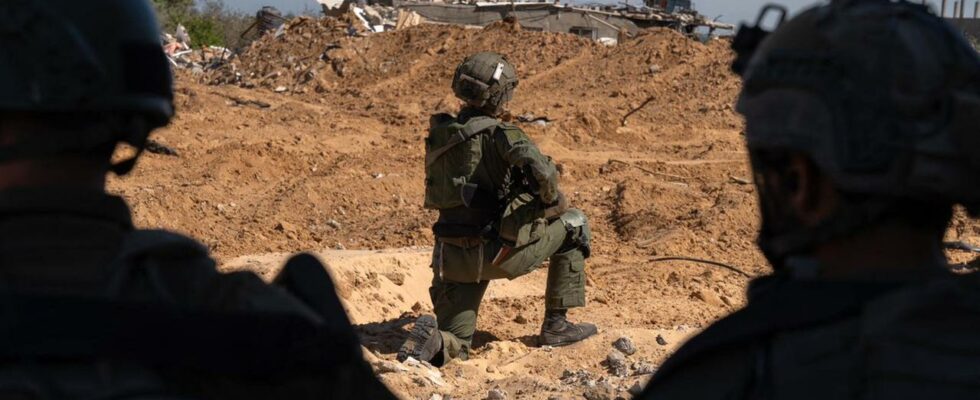There is confusion over the Israeli military’s announcement of temporary and local pauses in fighting in the southern Gaza Strip. Neither Defense Minister Gallant nor Prime Minister Netanyahu apparently knew about the plans.
The ceasefire announced by the Israeli military in the south of the Gaza Strip was apparently not coordinated with the government. Neither Prime Minister Benjamin Netanyahu nor his Defense Minister Yoav Gallant approved the plans, reports ARD correspondent Christian Limpert.
The Israeli military announced on Sunday morning that it would observe a daily “tactical pause in military activity” in the south of the Gaza Strip until further notice. This localized pause would apply from 8 a.m. to 7 p.m. and would allow for the delivery of a larger amount of aid, the armed forces announced via X and Telegram. It concerns the route that leads from the Kerem Shalom border crossing to Salah al-Din Street and then further north. The decision was made following consultations with the United Nations and other organizations, it said.
COGAT, the Israeli military agency that oversees aid distribution in the Gaza Strip, said the route would increase the flow of aid to other parts of the Gaza Strip, including Khan Younis, Muwasi and central Gaza.
“Contradictory Declarations”
“There are conflicting reports about these tactical ceasefires,” reports ARD correspondent Limpert from Tel Aviv. Israeli media reported that Defense Minister Gallant had neither examined nor approved the military’s plans. He was angry about the timing, especially since the army announced the deaths of a total of eleven Israeli soldiers in the Gaza Strip over the weekend.
Prime Minister Netanyahu also said he knew nothing about the plan and demanded an explanation from the military. “As of now, it cannot be assumed that there will really be a large-scale tactical ceasefire,” said Limpert.
Criticism from the right-wing extremists
Following criticism from ultranationalists in Prime Minister Netanyahu’s government who oppose a pause in the war, the military said that fighting in the rest of the southern Gaza Strip would not be suspended, nor would there be any changes to the import of aid in general. “The Israeli military says very clearly that there is no change in strategy in the southern Gaza Strip,” said Limpert.
The military’s announcement was met with fierce opposition from right-wing extremist politicians. Police Minister Itamar Ben-Gvir wrote on X that whoever made this decision “while our best soldiers are dying in battle” was “a fool and an idiot who should not remain in his post.” Finance Minister Bezalel Smotrich wrote: “The humanitarian aid that continues to reach Hamas keeps them in power and threatens to destroy our successes in the war.”
According to military sources, eight Israeli soldiers were killed in fighting in Rafah on the border with Egypt on Saturday. Hamas had previously announced that it had killed and injured several Israeli soldiers in an attack on a troop transport vehicle in Rafah.
Situation for the people catastrophic
The humanitarian situation in the Palestinian territory is catastrophic, aid organizations have been pointing to a shortage of food and other essential goods for months. Thousands of people do not have enough drinking water and food, and many children are suffering from acute malnutrition.
The World Food Programme (WFP) had warned that people in the southern part of the Gaza Strip, which is controlled by the Islamist terrorist organisation, could soon suffer from the same catastrophic hunger situation as those in the northern areas. “The situation in southern Gaza is deteriorating rapidly,” said WFP Deputy Director Carl Skau after a two-day visit to the region on Friday.
One million people displaced from Rafah
One million people have been displaced from Rafah on the border with Egypt and are crammed into an overcrowded area along the beach in the sweltering summer heat. In the northern part of Gaza, the supply of aid has improved somewhat, said Skau. However, the distribution of food is not guaranteed in the long term.
The war in the Middle East was triggered by the major Hamas attack on Israel on October 7, in which Islamist fighters killed 1,194 people and abducted 251 people as hostages in the Gaza Strip, according to Israeli sources. In response, Israel has since launched a massive military operation in the Gaza Strip. According to figures from the Hamas-controlled Ministry of Health, which cannot be independently verified, more than 37,290 people have been killed so far.

